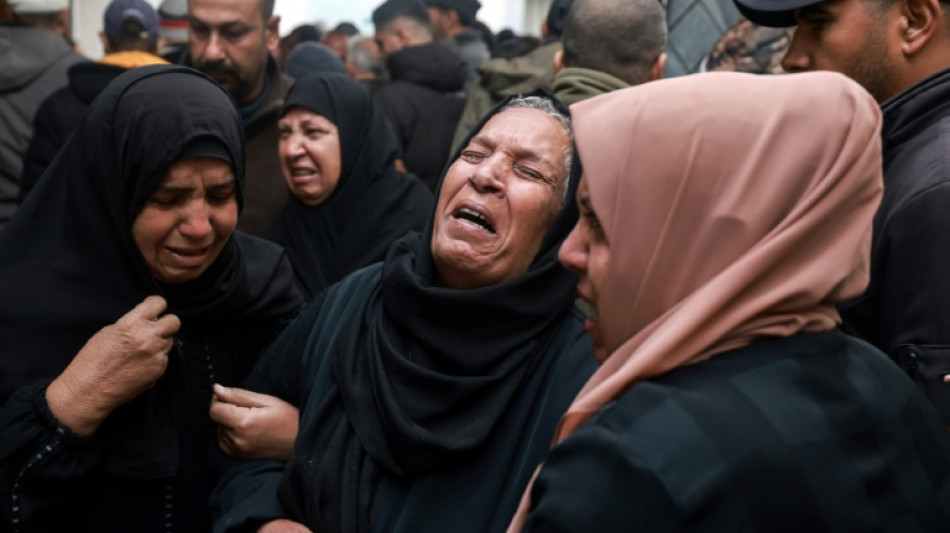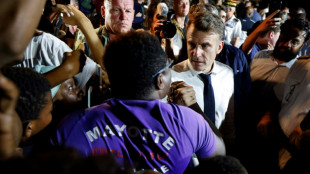

Southern Gaza hit as Israeli spy chief holds new talks
Israeli air strikes targeted homes in southern Gaza, witnesses said on Friday, adding to what aid groups describe as an increasingly hopeless humanitarian situation despite efforts towards new truce talks.
An Israeli delegation led by David Barnea, head of the Mossad intelligence agency, has arrived in Paris in efforts to "unblock" truce discussions in the war with Hamas militants.
His trip follows what the health ministry in Hamas-run Gaza said was the death of more than 100 people over the previous day.
Israeli bombardment destroyed one house and left a gaping hole in the earth east of Rafah, on the border with Egypt, where about 1.4 million Gazans have converged in a futile search to escape the fighting.
"We were sleeping in our house when we heard the sound of a missile," said Abdul Hamid Abu el-Enein. "We rushed to the site and found people martyred and injured" in the strike which "completely erased" the two-storey home.
Witnesses reported several other houses targeted during the night, and an AFP reporter described heavy strikes in the city of Khan Yunis to the north, as well as in Rafah itself.
Israel has threatened to send troops into the packed southern city of Rafah, drawing international criticism.
The military said fighting, including with drone strikes and sniper fire, continued in the western Khan Yunis area.
More than four months of fighting and bombardment have flattened much of Gaza and pushed its population of around 2.4 million to the brink of famine as disease spreads, according to the United Nations.
"We have reached the point of extreme poverty and hunger," 62-year-old Zarifa Hamad, a displaced woman living in a camp in northern Gaza told AFP. "Children are dying of hunger. The elderly are dying of hunger, diabetes, blood pressure... everybody is suffering."
"We have started to eat grass."
- Paris talks -
The war started after Hamas's unprecedented October 7 attack which resulted in the deaths of about 1,160 people in Israel, mostly civilians, according to an AFP tally of official figures.
Hamas militants also took hostages, 130 of whom remain in Gaza including 30 presumed dead, according to Israel.
Israel's relentless bombardment since has killed at least 29,514 people, mostly women and children, according to the latest count by Gaza's health ministry.
The toll has seen pressure grow on the administration of US President Joe Biden to rein in its ally Israel -- which it provides with billions of dollars in military aid.
Brett McGurk, White House coordinator for the Middle East and North Africa, held talks this week with Israeli Defence Minister Yoav Gallant in Tel Aviv, after meeting with other mediators in Cairo.
Hamas chief Ismail Haniyeh was in the Egyptian capital for truce talks earlier in the week, the group said.
A Hamas source said the new plan proposes a six-week pause in the conflict and the release of between 200 and 300 Palestinian prisoners, in exchange for 35 to 40 hostages still held by Hamas.
Israeli media reported Friday that Barnea would be joined by Ronen Bar, chief of the Shin Bet domestic security agency, for the Paris discussions.
Barnea and his US counterpart from the CIA helped broker a week-long truce in November that saw the release of 80 Israeli hostages in exchange for 240 Palestinian prisoners held in Israeli jails.
Washington's National Security Council spokesman John Kirby told journalists that so far the discussions were "going well", while Benny Gantz from Israel's war cabinet spoke of "the first signs that indicate the possibility of progress".
- 'Die hungry' -
At the Najjar hospital in the southern city of Rafah on Friday, mourners grieved over two dead children whose faces poked through white shrouds.
Mahmud Jarghun said he had no hope in the negotiations because "the intention is to annihilate the Palestinian people".
"I want to die hungry," he said, so "God will hold them accountable for what we are suffering from."
Fierce gun battles occurred in the neighbouring Zeitun district, where tanks were deployed, according to witnesses.
The army said helicopters were in action to support "targeted raids" in the area.
"I fear we are on the edge of a monumental disaster with grave implications for regional peace, security and human rights," said Philippe Lazzarini, head of the UN agency for Palestinian refugees (UNRWA).
Several leading donors suspended funding to UNRWA in response to Israeli allegations that some of its staff participated in the October 7 attack on Israel.
The UN fired the employees accused by Israel and has begun an internal probe of UNRWA, but Lazzarini said Israel has provided no evidence against them.
- Post-war plan -
Israeli Prime Minister Benjamin Netanyahu has proposed a plan for post-war Gaza that would dismantle UNRWA, and envisages Gaza's civil affairs run by local Palestinian officials without links to Hamas.
Even after the war, the Israeli army would have "indefinite freedom" to operate throughout Gaza to prevent any resurgence of terror activity, according to the plan.
The plan, seen by AFP, was swiftly rejected by the Palestinian Authority.
Earlier this week the Israeli parliament rejected "unilateral recognition" of a Palestinian state.
With Arab support, Washington has called for a pathway to a Palestinian state in an effort to ensure peace.
A UN report Friday said "gross human rights violations" had been committed by all parties in Israel and the Palestinian territories, and demanded accountability and justice to foster peace.
burs-rox/dv
D.Richter--MP




